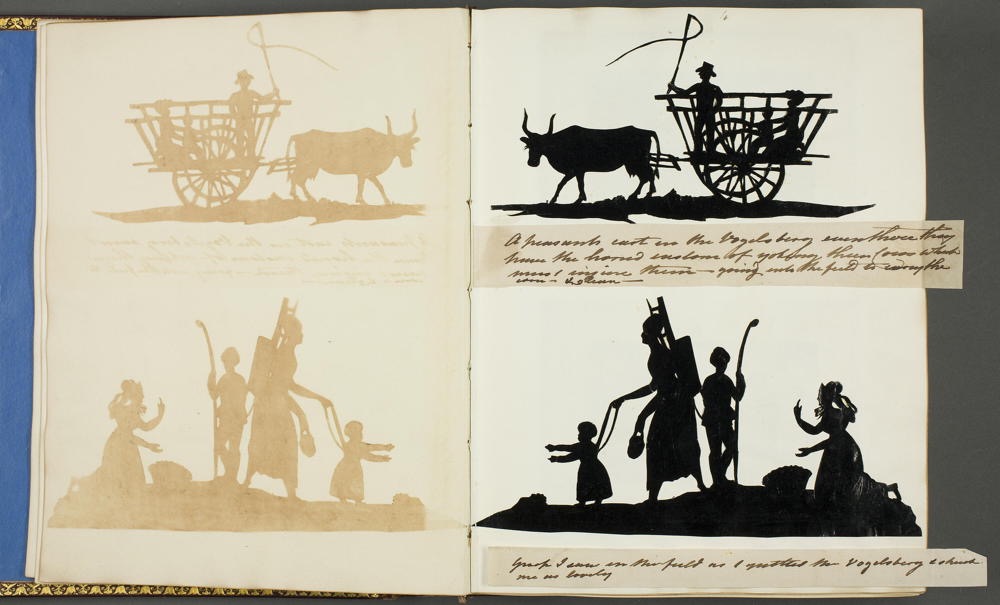FeepingCreaturism

Various Unnamed European Artists (19th century),
compiled by Queen Adelaide of England:
Queen Adelaide’s Album (1823–1837)
" … something quite the opposite of an encyclopedic rendering."
The arc of history seems to trend toward the ever simpler. What starts as complexity resolves into simpler forms through extended iteration until it might almost seem routine. We eliminate apparent meaningless effort to focus activity toward producing results, dropping ceremony in favor of what we firmly believe to be ever greater efficiencies. Left to its own devices, genealogy would probably eventually smother itself with ever-greater detail, for every life has always been lived at one-inch-equals-one-inch scale, so every representation can be found to be wanting: another clever exposition, another sidebar comparison, another history lesson to better outline the then present context. The genealogist never rests. He's always looking for additional angles. Without care, any Fambly's history might mature to become precious, even self-conscious, when it probably should have remained in some much simpler forms.
Engineers use the term FeepingCreaturism to label this tendency for something to become ever more complex in development. What usually began with naively simple notions becomes ever more grandiose over time, justified by the notion that as long as the hood's already open, any additional effort might ultimately prove worth it. Expanding complexity eventually either collapses in on itself or comes to Jesus in the form of some radical reformation. Features get axed until the developers can reach their arms around the specifications again, and the result finally takes on a workable form. The fact that things unchecked tend to naturally expand toward the impossible provides one great reason to maintain a tight budget over development. Beyond some modest point, the less invested, the more valuable the result.
However, such simplicity might only be achievable by first routing through considerable unnecessary complexity. Every essence results from reducing a substance and inevitably produces waste. However simple the original notion, it must inevitably prove naive and in desperate need of expansion. This injects some ultimately unworkable complexity, which must be removed if the result is ever to become viable. So, while the arc of history trends toward simplicity, the arc of genealogy routes the journey through unnecessary complexity to achieve that end. It's up to the genealogist to recognize the edge and to find ways to back away from it. The study always starts with large unresolved chunks. Resolution inevitably involves dredging out even more details, but these overwhelm and must somehow be returned to relatively simple patterns, or the whole study renders itself unintelligible. The result must be simple but not the naive simple initially embraced. The target simplicity considers and discards a lot of complexity before it's finally distilled.
The reason this Fambly effort has sometimes seemed overwhelming appears to have been because it was. Overwhelmed feelings seem to be a standard feature when attempting to juggle too much complexity. This first seems evidence of inadequacy rather than simply a matter of inevitability. At a certain uncertain level of complexity, one should naturally feel overwhelmed and inadequate. It does not necessarily follow that these feelings should prompt attempts to overcome them by getting better, faster, cheaper, or smarter. In most ways, we're already as smart as we were ever going to get. We're not usually missing education but more often lacking a realization. Resolution may come by simply ceasing the effort that first seemed so necessary. That sense of necessity can steal choice until it undermines purpose. Even I eventually come to ask after my original intentions.
Understanding my history might mean something quite the opposite of an encyclopedic rendering. There couldn't possibly be any bottom to attempting to ferret out all the necessary details. I need not pave what always were rough trails. I must leave enough for future Fambly genealogists to uncover. My product must be simple enough to provide better context. Much of the rest of the story will likely tell itself, as it has for me.
©2024 by David A. Schmaltz - all rights reserved


